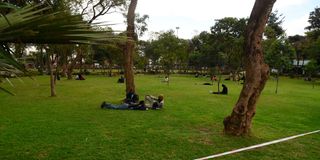Why our cities need more green spaces

People take a rest at the Nyayo Gardens in Nakuru City. Nakuru city has been earmarked to be a clean green city ahead of others.BONIFACE MWANGI/NATION
Environmentalists and community leaders have emphasised the need for including green spaces when designing cities. The experts gathered recently in Nakuru to discuss interventions to curb air pollution, one of the world’s leading health hazards.
Speaking during celebrations to mark the International Day for Clean Air and Clear Skies whose theme was ‘Together for Clean Air’, they focused on petroleum products, charcoal, wood and solid waste, which release greenhouse gases such as carbon, carbon monoxide, sulphur dioxide, and nitrogen oxides. These gases deplete the ozone, weakening its ability to block harmful ultraviolet sun's rays that cause overheating.
“Human activities are causing environmental degradation in our cities and towns and we should thus look for solutions urgently,” said Grace Karanja, Nakuru County director of Environment and Natural Resources.
PM2.5 particles from air pollution can damage the lungs and cause brain damage and stroke. Other health risks are heart disease, asthma and low birth weight.
In this regard, urban planners have been urged to design urban centres with open and green spaces, which will act as carbon absorbers, air fresheners and recreational facilities.
A study by SEI Africa Centre has linked pollutants and heating to health issues in cities. The study highlights the importance of creating liveable, equitable and enjoyable urban environments for residents. This is especially crucial as more people move to urban areas.
Kenya’s urban population has grown at a rate of four per cent, as reported by UN-Habitat in 2020. Since independence, the urban population has increased from 12 per cent to 29 per cent of the total national population. Currently, around 16 million people out of a total population of 55 million reside in urban areas.
Prof Eleni Myrivili, UN global chief heat officer, explains that cities and towns are typically a few degrees hotter than the surroundings because of heat released by fossil fuels and absorbed by infrastructure such as asphalt roads and concrete car parks.
She advises modern city planners to emphasise inter-spacing green spaces and water bodies, with regular infrastructure development to mitigate atmospheric heating and trap carbon emissions.
“Burning fossil fuels has made heat waves increase and become more common. People are just starting to realise that we are dealing with another beast – the heating of urban centres. We need to replace our road surfaces with permeable road surfaces, create strategic water bodies and plant a lot of trees to lower temperatures,” she emphasises.
“Yet when Kenyans see open spaces in towns, they consider them as “wasted land,” laments Joseph Kopejo, director Nakuru County National Environment Management Authority. “With climate change increasing the intensity and frequency of heatwaves, urban planners, developers and Kenyans must start appreciating the need to have undisturbed spaces. I love walking. In Kajiado County, I can walk for kilometres, but here in Nakuru, you hardly walk a kilometre without encountering structures,” Mr Kopejo states.
He explains that after the gazettement of air quality regulations, the National Environment Management Authority is currently implementing the law targeted at stationary polluters such as industries and other enterprises and that the agency is working on modalities to address mobile polluters such as vehicles.
Wilson Gitu, the Nakuru Business Association chairman, says the business community is seeking collaboration with the county government to set up an electric-powered Bus Rapid Transport system. “This will improve mobility in a city whose mantra is ‘a modern city enhancing quality of life and promoting economic prosperity’,” he says.
“I envision a city with world-class green amenities, which guarantees our people good health and promises sustainable development to our future generations, out of clean air interventions such as an efficient green transport system and a waste management system that emphasises three principles of reduce, re-use and recycle,” says Frank Kiiru, a resident of Nakuru City.


